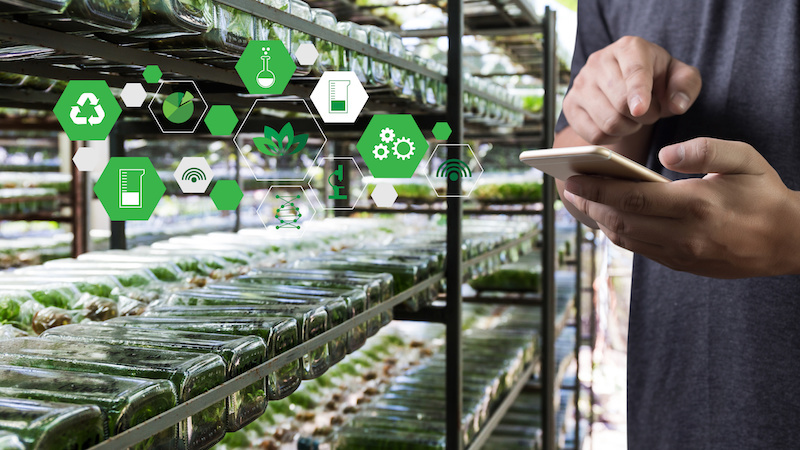Help shape a new programme that will revolutionise the UK’s Food & Drink system

FeedUK will drive technology adoption and make the UK Food & Drink system the most robust and innovative globally.
FeedUK is a project conceived by the food and drink system, led by the system, built with the system for the overall benefit of the system both now and in the future.
The objectives of the FeedUK are to create:
- A digital overview of the national food system that delivers transparency, interoperability and incentives for participation to all stakeholders within the system;
- A digital ecosystem that both underpins the food system and enables novel digitally enabled business models that drive productivity, reduce waste and create highly skilled jobs;
- An enabling smart tool or digital twin operating at whole and subsystem levels (farming, export and import, manufacturing, logistics, food service, retail) that enables up to date and effective decision making for both the private and public sector.
FeedUK will be a large national collaborative programme, led by the industry, that will span over the duration of four years. It will be a food and drink system digital resilience programme that will revolutionise the UK’s approach to its food system by driving technology adoption and making it the most robust and innovative globally.
To help shape FeedUK, sign-up for one of the Briefing Sessions now.
The challenge
The food system is complex, interdependent, global and local, evolving and responsive to knocks and challenges. There are reducing but still high levels of food waste. The current Covid-19 crisis has illuminated both strengths & challenges in terms of resilience and on-shelf availability. Trucks are on average only part-loaded, resulting in additional congestion and pollution. There is a significant variance between the most efficient and the least efficient, and all this is achieved with substantial amounts of working capital. There is lots of room for improvement.
Compared to other sectors, Food and Drink have a low level of digitalisation and R&D, in large part due to the low value, high volume nature of production. As such, there remains the significant untapped potential for innovation and increased resilience with regards to end to end optimisation of the system. This can free up data flows across the system, and significantly increase the efficiency of the flow of food and finance.
Whereas the food system has coped with the demand-driven challenges from COVID-19, it is the supply-driven challenges of leaving the EU and Climate change that will test the system to the core. Digitalisation, combined with a mutually beneficial collaboration framework developed in a pre-competitive environment, has the potential to provide significantly increased resilience. However, due to the complexity of the system, this cannot be done without the widespread collaboration of the leading organisations across the sector.
FeedUK aims to drive innovation in the Food and Drink Sector establishing strong collaboration among different stakeholders. The project will identify the requirements, policies, business case and behaviours to build a resilient digital food infrastructure. This will support development of solutions which enable policy, technology and science to feed into a food system which is open, interoperable and resilient. It will have permissioned data sharing between companies in line with agreed governance and incentives to unlock the value in data for those that generate it.
The impact of FeedUK
FeedUK will remove physical and financial waste from the food system through enabling the effective flow of information between stakeholders. Benefits delivered will be to the below groups:
Business
- Claim validation & verification
- Process optimisation
- Access to new products & services to incentivise better performance
UK Government
- Enable diagnosis of challenges and identify areas of risk and opportunity
- Provide UK-wide ability to model scenarios
- Drive compliance and implement policy
- Input into strategic planning of national infrastructure and economic forecasts
- Allow communication of national statistics and citizen engagement
Additionally, the outcomes of each phase will demonstrate digital and geospatial infrastructure which could have the potential to:
- Overhaul current payment systems, protecting the most vulnerable in value chains and providing reassurance in times of crisis for supply to SMEs (worth £28bn in the UK food system).
- Provide more robust data to complementary industries (finance, utilities, transport, healthcare
- Create tools to enable continuous improvements across the food system.
Service Providers
- Access to new markets for services that incentivise process optimisation and sustainability
Deliverables
- Digital twin replicating physical in digital to optimise flows of goods and money
- Data exchange infrastructure and marketplace
- Claim validation & verification to enable transparency and traceability
Engagement
For FeedUK to be successful, the industry must take leadership and co-design the solution for the benefit of the system and not merely their own stakeholder groups. The food system will be represented by the Food and Drink Sector Council and the UK’s innovation community (currently represented by the Catapults and the AgriTech centres). It will work to support the vision defined and maintained by industry throughout the programme.
Ultimately, we aim for the programme to be sponsored by BEIS, DCMS, FSA and DEFRA, and managed by the Food and Drink Sector Council.
Briefing Sessions
We are holding two online Briefing Sessions about FeedUK, on 2nd and 7th of September.
The purpose of the Briefing Sessions is to enable industry to co-develop the proposal which we will then submit to the Treasury. There will be two general briefings for all stakeholders which will explain the purpose, vision and process that we are proposing for FeedUK. This will then be followed by a series of more focussed sessions for each tier of the food system.
By the end of the process we aim to have secured letters of support from 100 companies from across the food system.
These will be followed by workshops for the following groups:
- Agriculture
- Manufacturing
- Logistics
- Retail & wholesale
- Food Service
- Regulators
- Technology

